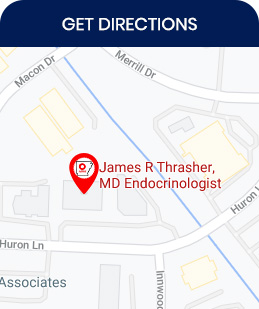Testosterone Disorders Treatment Specialist in Little Rock AR
Treating testosterone disorders is a personalized process, as the causes of testosterone fluctuations can vary greatly. While age-related decline is common, testosterone levels can fluctuate or cause issues at any age. Come to Arkansas Diabetes and Endocrinology Center for testosterone disorders treatment. For more information, Contact our office to schedule an appointment. We are conveniently located at 11400 Huron Lane, Little Rock, AR 72211.


Table of Contents:
What happens when a man’s testosterone is low?
How do you check testosterone levels?
How do you improve testosterone levels?
How do you fix testosterone problems?
Low testosterone in men can have a widespread effect on many different aspects of their overall health and wellness. Testosterone, a vital sex hormone, plays a key role in various bodily functions including the development of bones and muscles, the production of sperm, hair growth, and the deepening of the voice.
As men age, it’s normal for testosterone levels to decline, leading to several signs and symptoms. This decline can result in a significant loss of muscle mass and reduction of bone volume, increasing susceptibility to injuries such as fractures.
Men with low testosterone may experience a wide range of altered sexual effects, including reduced sex drive and erectile dysfunction. There could be a reduction in testicle size and a decrease in the amount of semen produced. This condition can also lead to an increase in body fat, hair loss, and other unwanted physical changes.
Beyond physical symptoms, low testosterone can have a profound impact on emotional and mental health, potentially leading to difficulty sleeping, mood swings, depression, anxiety, and decreased energy levels. These symptoms can influence and exacerbate one another, creating a cycle that’s hard to break.
Checking testosterone levels is a critical step in diagnosing and managing low testosterone. Testosterone levels naturally fluctuate and change over time and can decline with age. When individuals notice symptoms of low testosterone, they may opt for testosterone testing. This testing can measure both total and free testosterone levels, typically through blood tests or saliva tests.
These tests check to ensure that patients’ testosterone levels fall within the appropriate range for their general health and age group. Individuals concerned about reproductive health or symptoms associated with testosterone fluctuations can expect a straightforward testing process with quick results turnaround. Following this, a customized treatment plan is implemented, tailored to aid in recovery and address the specific needs and concerns of the patient.
Improving testosterone levels involves a combination of medical interventions and lifestyle modifications. Consulting specialists like those at Arkansas Diabetes and Endocrinology Center is the first and most crucial step in this process. By consulting with these experts, patients can receive a treatment plan that addresses the root cause of their specific low testosterone issue. Without professional guidance, lifestyle changes might not effectively target the underlying issue.
Generally effective lifestyle interventions to boost testosterone levels include exercise and weight training, which can help offset symptoms like increasing body fat and reduced muscle mass. A diet balanced in carbohydrates, fats, and proteins can maintain healthy testosterone levels, with an emphasis on sufficient protein intake to aid in weight loss efforts.
Healthy fats are also important for hormone balance and supporting testosterone levels. Additionally, increasing vitamin D intake and taking necessary supplements can help address declining testosterone levels. Minimizing stress and cortisol levels is another crucial aspect, as high cortisol can influence weight gain and exacerbate symptoms of testosterone deficiency.
High-quality, restful sleep boosts testosterone levels and facilitates the adherence to lifestyle changes necessary to improve testosterone levels. Reducing alcohol intake and exposure to estrogen-like chemicals is also advisable.
Fixing testosterone problems is a personalized process, as the causes of testosterone fluctuations can vary greatly. While age-related decline is common, testosterone levels can fluctuate or cause issues at any age. The first step is visiting specialists, such as those at Arkansas Diabetes and Endocrinology Center, for a diagnosis and a comprehensive treatment plan tailored to individual needs.
Treatment may involve health and lifestyle interventions, including instilling healthy habits. When consulting with testosterone specialists, treatment plans are designed around the root cause of the specific issue. This could involve a range of treatment interventions, such as testosterone replacement therapy administered through injections, gels, patches, or other methods.
These treatments aim to restore sexual function, boost energy levels, and increase muscle mass, tailored to everyone’s needs and health profile. Guidance is provided to manage all aspects influencing testosterone problems, aiding men towards a swift resolution of symptoms while addressing the underlying cause for a fulfilling and healthier life.
Treatment for testosterone disorders is available at Arkansas Diabetes and Endocrinology Center. Visit us online today for directions to our leading healthcare clinic! We serve patients in a wide variety of areas across the state, and we are here to help always keep your health in check. Today (please note that UnitedHealthcare no longer convers telemedicine appointments.) If the commute is too far away for you and your family, then learn more about our telehealth services today! Our clinic is located in Little Rock, AR however, we serve patients from Conway AR, North Little Rock AR, Pine Bluff AR, Hot Springs AR, Benton AR, Sherwood AR, Russellville AR, Jacksonville AR, Cabot AR, Searcy AR, Bryant AR, Jonesboro AR, Forrest City AR, Magnolia AR, Camden AR, Malvern AR, Batesville AR, Arkadelphia AR, Clarksville AR, Monticello AR, Heber Springs AR, Morrilton AR, Stuttgart AR, Greenbrier AR, Sheridan AR and Vilonia AR.







